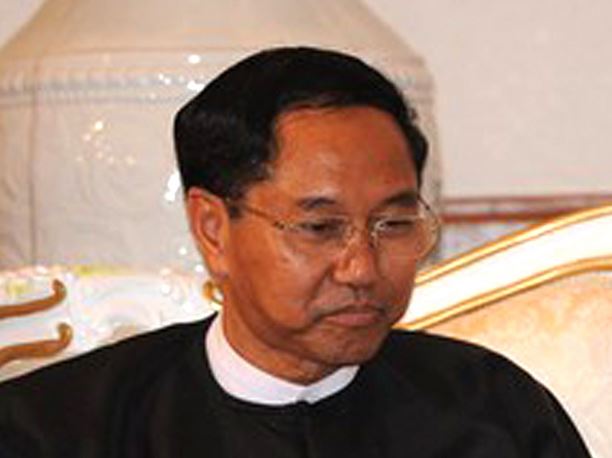Across Burma, Htin Kyaw’s appointment as president on Tuesday was greeted with optimism as finally a civilian, and not a general, will lead the government. But the simultaneous approval of the military’s choice for vice-president, Myint Swe, shocked those who suffered under the junta-era hardliner.
Observers warn his appointment may indicate that the military has no intention of co-operating with the incoming National League for Democracy (NLD) government, which will seek sweeping reforms.
Myint Swe gained 213 votes out of 652 cast, getting votes from the Union Solidarity and Development Party (USDP) and military lawmakers occupying a quarter of parliament. He became first vice-president, a key government position that will give him a seat on the 11-member National Security and Defence Council.
Trusted Aung San Suu Kyi aide Htin Kyaw gained the majority vote and he is expected to become a “proxy president” who defers to the NLD leader for all important government decisions.
As the first vice-president, Myint Swe would serve as Acting President, albeit temporarily, if the presidency falls vacant due to resignation, death, permanent disability or any other cause.
“I am extremely surprised about this appointment. U Myint Swe supervised the brutal crackdown on the Saffron Revolution in 2007,” said Thobita, a Buddhist monk in Mandalay who participated in the monk-led democratic uprising and was subsequently imprisoned by authorities.
Myint Swe was military commander of Rangoon Region and oversaw the deployment of soldiers to violently clear protesters from the streets of Burma’s biggest city. Before the crackdown, he had been functioning as “Than Shwe’s eyes and ears” in Rangoon, a 2006 US Embassy cable released by Wikileaks said. Myint Swe was placed on a US Treasury sanctions list for Specially Designated Persons for his role in the crackdown.
At the start of Burma’s democratic transition in 2010, Myint Swe shed his uniform to join the USDP and become Rangoon Region chief minister, a position he held until recently.
He is seen as having the trust of former strongman Than Shwe, so much so that Myint Swe was put in charge of Burma’s notorious spying apparatus, the Military Intelligence, after its powerful chief, Khin Nyunt, was purged in 2004.
Kyaw Win, a well-known local political analyst, said the appointment of Myint Swe as vice-president – instead of a more reform-minded ex-general – showed the enduring power of the retired Than Shwe, now 83 and living in a heavily guarded compound in the capital Naypyidaw. “He can still retain his influence on the army,” Kyaw Win said.
According to NLD MP Ba Myo Thein, who was on the parliamentary commission vetting the presidential nominees, Myint Swe was selected by the army to “protect its interests”. The military elites and families control several businesses.
Asked how an US-blacklisted ex-general could pass the parliamentary vetting process, Ba Myo Thein said, “The Constitution doesn’t say anything about overseas blacklisting.”
Myint Swe was nominated for the position once before, in 2012, but it turned out his son-in-law held Australian citizenship, which banned him from the position under the Constitution’s Article 59(f), the same clause that prevents Suu Kyi from assuming the presidency as her sons are British nationals.
Taryar Myint Swe, the son-in-law, has renounced his Australian citizenship, according to Ba Myo Thein.
‘A very poor and potentially confrontational choice’
Nyo Nyo Thin, a former MP in the Rangoon Region parliament, said as chief minister Myint Swe had resisted reforms and transparency, while his role in awarding a cancelled real estate project to an unknown company raised questions.
This, she said, does not bode well for his new role in a NLD-led cabinet. “Myint Swe’s term as [chief minister] left the clear impression that he is an old-style army loyalist. That’s why he was chosen by the army for this (vice-president) position,” Nyo Nyo Thin said.
David Mathieson, senior researcher for Human Rights Watch, said, it was “a very poor and potentially confrontational choice by the Tatmadaw (army) to nominate Myint Swe and then vote him in.”
“Unfortunately this augers badly for improved NLD-Tatmadaw cooperation, Myint Swe is a symbol of the former military regime … He represents all the forces that may limit or thwart the nascent democratic transition.”
Myint Swe could not be reached for comment despite repeated attempts by Myanmar Now to contact him.
USDP MP Hla Htay Win defended the appointment and said Myint Swe had been selected because of “his good experience” in senior government positions.
[related]
Asked how the United States is going to deal with Vice-President Myint Swe and whether he will remain on the sanctions list, US State Department spokesperson John Kirby told reporters last week, “I have seen nothing that says this individual is going to be taken off that list.”



